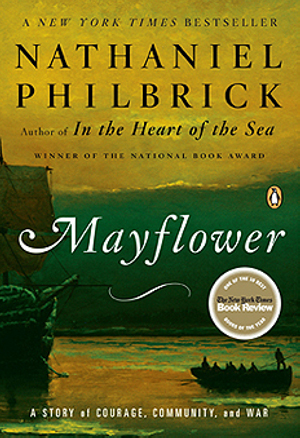
Mayflower by Nathaniel Philbrick
(NY: Penguin Books, 2007. 480 pp. $16.00, ISBN 978-0-14-311197-9)
Native American Studies/ American History
Every November “first Thanksgiving” experts come out of the wood work; articles appear in newspapers and magazines. Even segments on the evening news will appear retelling the national myth surrounding “The First Thanksgiving.”
What if, for once, instead of hearing “the story we know” we could hear “the story we need to know”?
Nathaniel Philbrick vividly brings to life the experience of the immigrant Mayflower passengers as well as the native Americans in “Mayflower.”
It is, he says, “a story of courage, community and war,” but it is also a story of peace and people working together across significant divides.
It is a story that spans decades although, as Philbrick points out, for many modern-day Americans American history begins with the Mayflower and moves immediately on to the American Revolution. The years in between are perhaps the most telling however, and comprise the story “we need to hear.”
The immigrants who arrived on the Mayflower in 1620 were not all pilgrims, and those who were arrived in a much different state than their original plans had called for.
In the beginning this group of outlaw religious zealots (as they would have been looked upon by most English citizens) formed a single church in Holland (where they had fled to avoid arrest in England).
In Holland they realized that while they wanted to be free from the religious laws in England, they still wanted to raise their children as English. The only solution seemed to be to move the congregation to an English colony.
While a majority of the congregation voted for this plan, by the time it was implemented less than a quarter of them would actually go, choosing instead to remain in Leiden, Holland.
To fill the ships (there were two!) they were forced to allow “strangers” chosen by the company backing their voyage to accompany them. One of the ships sank and the final passenger list that set sail on the Mayflower was close to 50 percent pilgrims, 50 percent strangers.
The pilgrims had been able to keep pretty much to themselves in Holland, but they were forced to work closely with the strangers to create their new community.
For the pilgrims this was as difficult a step as many envision getting along with the native Americans would have been. They rose to the occasion however and created the Mayflower Compact as a civil authority both the pilgrims and strangers could agree to.
Another surprising aspect of the true tale of the Mayflower immigrants is that although they made many mistakes in their first year of relations with the natives, they did forge working relationships and engaged in the political process of the natives themselves.
Because Massasoit, the chief sachem of the Pokanokets, had saved their lives, the Pilgrims remained politically allied with him and over the next 50 years helped defend his tribe against other tribes numerous times.
This is particularly amazing because the Mayflower was not the first ship, nor its occupants the first Europeans, the Pokanokets had encountered and the earlier encounters (plural!) left a wake of fear, slavery and well-earned distrust.
The first Thanksgiving was a gathering of about 150 souls – Pokanokets, pilgrims and strangers. The Pokanokets outnumbered the immigrants nearly two to one.
The feast greatly resembled an English harvest festival and not at all what the pilgrims would have called a “thanksgiving celebration” but it was a testimony to the partnership between the two cultures.
It would be nice if the story could end on that happy note, but the story did not end then and did ultimately lead to war. King Philip's War was, percentage-wise, even bloodier than the Civil War. This, too, is part of the story we need to know.
Philbrick’s “Mayflower” is an engaging history and ably utilizes primary documents left by the pilgrims and first generation of settlers while at the same time making the story accessible to 21st century minds.
“Mayflower” is perfect reading material for your Thanksgiving holiday, but if you have a long drive ahead of you, you may want to consider getting the abridged version on CD.
Happy Thanksgiving!
Geri Williams is a local book fancier.

 How to resolve AdBlock issue?
How to resolve AdBlock issue? 






